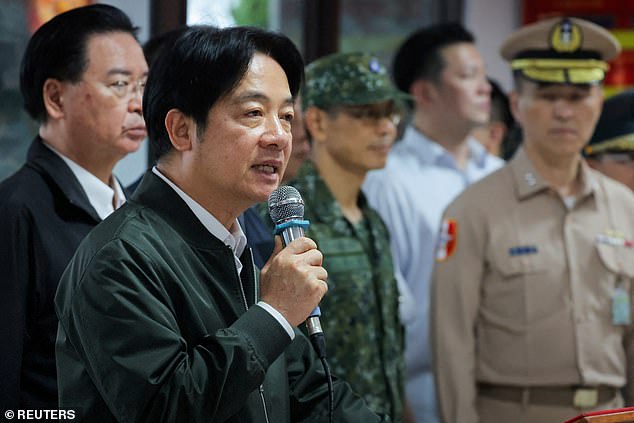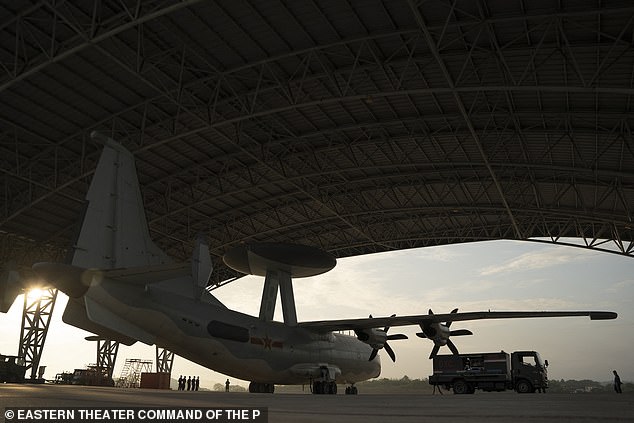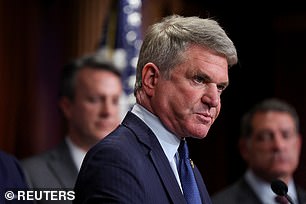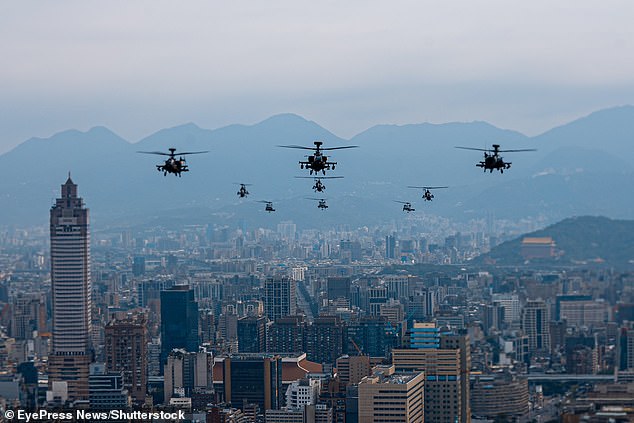US lawmakers arrived in Taiwan on Sunday as Chinese warplanes flew overhead and the US State Department accused Beijing of “military provocations”.
China held extensive military exercises around the island on Thursday and Friday following the inauguration of President Lai Ching-te.
Beijing called the military exercises “punishment” for Lai’s inaugural speech, which China described as another push for the island’s formal independence.
This week’s visit was the first by a US congressional delegation since Lai took office on May 20. It is intended as a show of support even after Chinese officials expressed opposition to the trip by the bipartisan group of lawmakers.
‘I think it is very important that we show our strong support for Taiwan. I think it’s a deterrent,” Rep. Michael McCaul, R-Texas, chairman of the House Foreign Affairs Committee, told NBC News before his arrival.
Taiwanese defense combat helicopters fly over Taipei City during presidential inauguration
A Chinese embassy official warned McCaul against the visit, according to an email first obtained by NBC News.
The email also described Lai’s inauguration speech as “the worst speech ever given by a new leader of Taiwan.”
“This demonstrates once again that Mr. Lai has chosen a path of independence and is on the path to implementing it,” the email said.
The delegation’s visit also comes after Congress recently approved about $2 billion in military aid to Taiwan in hopes of improving its defensive capabilities against China.
Also part of the delegation are Rep. Young Kim, R-Calif.; Rep. Joe Wilson, R-S.C.; Rep. Jimmy Panetta, D-Calif.; Rep. Andy Barr, R-Kentucky, and Rep. Chrissy Houlahan, D-Pa.
Lai, 65, who was the island’s vice president for the past four years, says he favors maintaining the status quo, without formally declaring independence or becoming part of China.
He has also said that only the people of Taiwan can decide its future. He has repeatedly offered talks, but China rebuffed him.
Lawmakers will meet with Lai on Monday.

Taiwanese President Lai Ching-te was sworn in on May 20.

A Chinese fighter jet preparing for the ‘Joint Sword-2024A’ military exercise over Taiwan
China has not ruled out the use of force to unify with Taiwan.
Taiwan’s Defense Ministry said it had tracked 49 Chinese military aircraft and 19 Chinese Navy ships operating around the island on Friday. He called Beijing’s exercises an “irrational provocation.”
In his inauguration speech, Lai urged China to cease its political and military threats against Taiwan, which he called “a frontline guardian of world peace.”
“I hope China faces the reality of the existence of the Republic of China, respects the decisions of the people of Taiwan and in good faith chooses dialogue instead of confrontation,” Lai said, using Taiwan’s formal name.
China expressed its disapproval of Lai in joint military exercises in the Taiwan Strait and around Taiwan-controlled island groups near the Chinese coast, prompting Taiwan’s military to mobilize its own forces.

Foreign Affairs Committee Chairman Michael McCaul, R-Texas, leads the U.S. delegation.
“This action targets Taiwanese independence forces and deters external forces from interfering, which is entirely reasonable, legal and necessary,” Chinese Defense Ministry spokesman Wu Qian said at a news conference on Friday. in Beijing.
The US State Department said on Saturday that the United States was “deeply concerned” about China’s military exercises in the Taiwan Strait and strongly urged it to exercise restraint.
“Using a normal, routine, democratic transition as an excuse for military provocations risks escalation and erodes long-standing norms that for decades have maintained peace and stability across the Taiwan Strait,” the State Department said in a statement.


